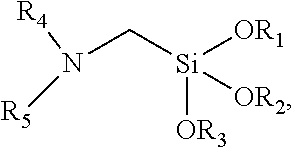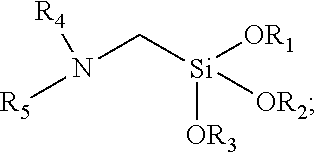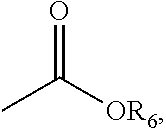Alpha-silane coupling agent and application thereof
a technology alpha-silane, which is applied in the field of polymer organic materials, can solve the problems of greatly limited application of silane coupling agent, and achieve the effects of good stability, strong reactivity and fast curing speed
- Summary
- Abstract
- Description
- Claims
- Application Information
AI Technical Summary
Benefits of technology
Problems solved by technology
Method used
Image
Examples
embodiment 1
[0066]Pouring 1.5 mol of n-propylamine, 0.1 g of potassium iodide and 300 mL of xylene into a 1 L reaction flask, heating the compound under nitrogen protection, when the temperature of the system was raised to 50° C., 0.5 mol of chloromethyltriethoxysilane was slowly dropped into the system, the temperature of the system was controlled at most 55° C., dropping was continued for about 1 hour, then thermostatic reaction was continued for 2 hours. After the temperature was lowered to room temperature, 300 mL of petroleum ether was added, and the resulting n-propylamine hydrochloride was filtered off. The solvent was removed under reduced pressure and then distilled, and the product of 105-110° C. / 5 mmHg was collected to obtain 97.7 g of colorless transparent α-n-propylamine methyltriethoxysilane. The yield was 83.1%.
[0067]Pouring 0.2 mol of α-n-propylamine methyltriethoxysilane into a 1 L three-neck boiling flask, heating the compound under nitrogen protection, when the temperature wa...
embodiment 2
[0070]Pouring 1.5 mol of n-butylamine, 0.1 g of potassium iodide and 300 mL of xylene into a 1 L reaction flask, heating the compound under nitrogen protection, when the temperature of the system was raised to 50° C., 0.5 mol of chloromethyltriethoxysilane was slowly dropped into the system, the temperature of the system was controlled at 55° C. or less, dropping was continued for about 1 hour, then thermostatic reaction was continued for 2 hours. After the temperature was lowered to room temperature, 300 mL of petroleum ether was added, and the resulting n-butylamine hydrochloride was filtered off. The solvent was removed under reduced pressure and then distilled, and the product of 108-116° C. / 5 mmHg was collected to obtain 100.0 g of colorless transparent α-n-butyl amine methyltriethoxysilane. The yield was 80.3%.
[0071]Pouring 0.2 mol of α-n-butylamine methyltriethoxysilane into a three-neck boiling flask, heating the compound under nitrogen protection, when the temperature was r...
embodiment 3
[0074]Pouring 1.5 mol of n-propylamine, 0.1 g of potassium iodide and 300 mL of xylene into a 1 L reaction flask, heating the compound under nitrogen protection, when the temperature of the system was raised to 50° C., 0.5 mol of chloromethyltrimethoxysilane was slowly dropped into the system, the temperature of the system was controlled at 55° C. or less, dropping was continued for 1 hour, then thermostatic reaction was continued for 2 hours. After the temperature was lowered to room temperature, 300 mL of petroleum ether was added, and the resulting n-propylamine hydrochloride was filtered off. The solvent was removed under reduced pressure and then distilled, and the product of 105-110° C. / 5 mmHg was collected to obtain 82.4 g of colorless transparent α-n-propylamine methyltrimethoxysilane. The yield was 85.4%.
[0075]Pouring 0.2 mol of α-n-propylamine methyltrimethoxysilane into a three-neck boiling flask, heating the compound under nitrogen protection, when the temperature was ra...
PUM
| Property | Measurement | Unit |
|---|---|---|
| molar mass | aaaaa | aaaaa |
| temperature | aaaaa | aaaaa |
| temperature | aaaaa | aaaaa |
Abstract
Description
Claims
Application Information
 Login to View More
Login to View More - R&D
- Intellectual Property
- Life Sciences
- Materials
- Tech Scout
- Unparalleled Data Quality
- Higher Quality Content
- 60% Fewer Hallucinations
Browse by: Latest US Patents, China's latest patents, Technical Efficacy Thesaurus, Application Domain, Technology Topic, Popular Technical Reports.
© 2025 PatSnap. All rights reserved.Legal|Privacy policy|Modern Slavery Act Transparency Statement|Sitemap|About US| Contact US: help@patsnap.com



